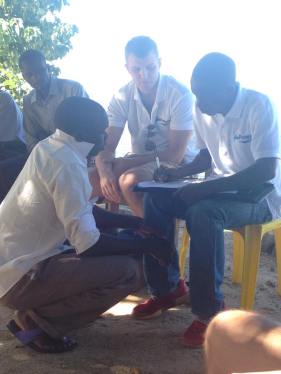We asked Lucy Harvey, Project Manager of Empower Malawi, what #TheNextFrontier means to her.
Charity: the money we all donate to help those in the developing world. Largely it doesn’t work, it’s unsustainable and most importantly, it fails to empathise with the priorities of those it’s aiming to help. This is the fundamental flaw in the system.
Take Malaria. For charities, the solution is to give mosquito nets to as many people as resources permit. Yet what they often fail to recognise is the context in which these people are living. In small fishing communities, for example, mosquito nets are used to catch fish. When the line is between a possibility of catching malaria, and a certainty of going hungry, it is easy to draw. The value a charity delivers in mosquito nets is huge – but when most are willing to sell these for a few hundred Malawian Kwacha, all value flushes out more quickly than you can say unsustainable.
Social enterprise looks to achieve what charity can’t. It gives communities sustained value, through allowing populations to decide their own priorities and to use the enterprise’s profits to achieve them. Empower Malawi operates in many impoverished communities along Lake Malawi. They are wholly reliant on the lake’s fish stocks for industry. Catching these fish at night, fishermen spend extortionate amounts on paraffin fuel, and fish for as long as they can in attempts to breakeven. No profit, and overfishing.
However, there is a solution: a solar lamp rental business. Solar panels are installed on a community entity roof, where the lights are charged and rented to fishermen for 70% less than the cost of paraffin. The lights are capped at seven hours, meaning physically less fish are caught; however due to the dramatic saving on fuel expenditure, fishermen make more money from catching less fish. These solar lights have reformed their industry.
Renting these lights not only ensures the longevity of this system, with a contingency repair fund built into the business model, but reinvests profits back into the community. The profits from the solar rental business remain in the hands of the community, rather than being exported to fuel sellers. This money can then be spent on their own ventures: I have seen ambulance boats bring built, getting those from the remotest villages to hospital in record speeds; I have seen chicken coops provided for unemployed women, so when fish catch from the lake isn’t so good, the community no longer starve.
No charity has ever “developed” a country. This is a short term solution, to a long term problem. Undoubtedly it is essential in some respects. But to develop the developing world, the next frontier – the only frontier – is enterprise.
Empower Malawi is a social enterprise operating within rural regions of Malawi. For more information on their project, check their website or follow them on Facebook for updates.
